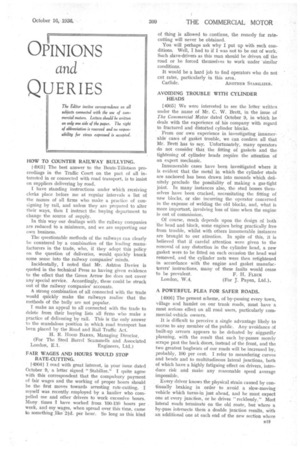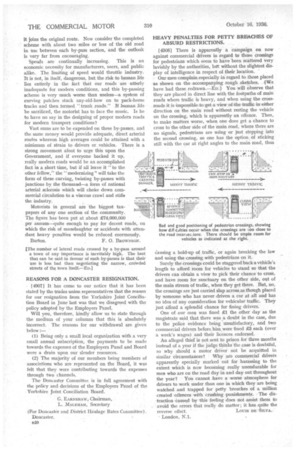OPINIONS
Page 57

Page 58

If you've noticed an error in this article please click here to report it so we can fix it.
and QUERIES
The Editor invites correspsndence on all subjects connected with the use of commercial motors. Letters should be written on only one side of the paper. The right of abbreviation is reserved and no responsibility for views expressed is accepted.
HOW TO COUNTER RAILWAY BULLYING.
[4903] The best answer to the Bouts-Tillotson proceedings in the Traffic Court on the part of all interested in or connected with road transport, is to insist on suppliers delivering by road.
I have standing instructions under which receiving clerks place before me at regular intervals a list of the names of all firms who make a practice of consigning by rail, and unless they are prepared to alter their ways, then I instruct the buying department to change the source of supply.
In this way our dealings with the railway companies are reduced to a minimum, and we are supporting our own business.
The questionable methods of the railways can clearly be countered by a combination of the leading manufacturers in the trade, who, if they adopt this policy on the question of deliveries, would quickly knock some sense into the railway companies' minds.
Incidentally, I noted that Mr. Ashton Davies is quoted in the technical Press as having given evidence to the effect that the Green Arrow fee does not cover any special service. Accordingly, these could be struck out of the railway companies' accounts.
A strong combination of all connected with the trade would quickly make the railways realize that the methods of the bully are not popular.
I make an appeal to all connected with the trade to delete from their buying lists all firms who make a practice of delivering by rail. This is the only answer to the scandalous position in which road transport has been placed by the Road and Rail Traffic Act.
H. R. HOOD BARRS, Managing Director. (For The Steel Barrel Scammells and Associated London, E.1. Engineers, Ltd.) FAIR WAGES AND HOURS WOULD STOP RATE-CUTTING.
[4904] I read with great interest, in your issue dated October 9, a letter signed " Stabilize." I quite agree with this correspondent that the compulsory payment of fair wages and the working of proper hours should be the first moves towards arresting rate-cutting. I myself was recently employed by a haulier who compelled me and other drivers to work excessive hours. Many times I have worked from 100430 hours per week, and my wages, when spread over this time, came to something like 21d. per hour. So long as this kind of thing is allowed to continue, the remedy for rate. cutting will never be obtained.
You will perhaps ask why I put up with such conditions Well, I had to if I was not to be out of work. Such slave-drivers as this man should be driven off the road or be forced themselves to work under similar conditions.
It would be a hard job to find operators who do not cut rates, particularly in this area.
Carlisle. ANOTHER STABILIZER.
AVOIDING TROUBLE WITH CYLINDER HEADS
[4905] We were interested to see the letter written under the name of Mr. C. W. Brett, in the issue of The Commercial Motor dated October 9, in which he deals with the experience of his company with regard to fractured and distorted cylinder blocks.
From our own experience in investigating innumerablecases of gasket trouble, we can confirm all that Mr. Brett has to say. Unfortunately, many operators do not consider that the fitting of gaskets and the tightening of cylinder heads require the attention of an expert mechanic.
Innumerable cases have been invegtigated where it is evident that the metal in which the cylinder studs are anchored has been drawn into mounds which definitely preclude the possibility of making a gas-tight joint. In many instances also, the stud bosses them selves have been cracked, necessitating the fitting of new blocks, or else incurring the operator concerned in the expense of welding the old blocks, and, what is more important, involving loss of time when the engine is out of commission.
Of course, much depends upon the design of both the head and block, some engines being practically free from trouble, whilst with others innumerable instances are brought to our attention. In spite of this, it is believed that if careful attention were given to the removal of any distortion in the cylinder head, a new gasket were to be fitted on each occasion the head wag removed, and the cylinder nuts were then retightened in accordance with the engine and gasket manufactmers' instructions, many of these faults would cease to be prevalent. F. H. FLECK London, W.4. (For J. Payen, Ltd.).
A POWERFUL PLEA FOR SAFER ROADS.
[4906] The present scheme, of by-passing every town, village and hamlet on our trunk roads, must have a most serious effect on all road users, particularly commercial-vehicle owners.
It is difficult to perceive a single advantage likely to accrue to any member of the public. Any avoidance of built-up arrears appears to be defeated by niggardly planning, with the result that such by-passes merely scrape past the back doors, instead of the front, and the two greatest bugbears of our roads will be increased by, probably, 100 per cent. I refer to meandering curves and bends and to multitudinous lateral junctions, both of which have a highly fatiguing effect on drivers, introduce risk and make any reasonable speed average impossible.
Every driver knows the physical strain caused by continually braking in order to avoid a slow-moving vehicle which turns-in just ahead, and he must expect one at every junction, or he drives "recklessly:" Most lateral roads terminate on the old route, but where a bypass intersects them a double juriction results, With an additional one at each end of the new section where it joins the original route. Now consider the completed scheme with about two miles or less of the old road in use between each by-pass section, and the outlook is very far from encouraging.
Speeds are continually increasing. This is an economic necessity for manufacturers, users, and public alike, The limiting of speed would throttle industry. It is not, in itself, dangerous, but the risk to human life lies entirely in the fact that our roads are utterly inadequate for modern conditions, and this by-passing scheme is very much worse than useless a system of curving patches stuck any-old-how on to pack-horse tracks and then termed ".trunk roads." If human life be sacrificed, the motorist has to face the music. Is he to have no say in the designing of proper modern roads for modern transport conditions?
Vast sums are to be expended on these by-passes, and the same money would provide adequate, direct arterial routes whereon high averages could be attained with a minimum of strain to drivers or ,vehicles. There is a strong movement afoot to urge this upon the Government, and if everyone backed it up, really modern roads would be an accomplished fact in a short time, but if all leave it "to the other fellow," the " modernizing" will take the form of these curving, twisting by-passes with junctions by the thousand—a form of national arterial sclerosis which will choke down commercial circulation to a viscous crawl and stifle the industry.
Motorists in general are the biggest taxpayers of any one section of the community. The figure has been put at about R74,000,000 per annum—quite enough to pay for decent roads, on which the risk of manslaughter or accidents with attendant heavy penalties would be reduced enormously.
Barton. F. 0. BROWNSON.
[The number of lateral roads crossed by a by-pass around a town of any importance is inevitably high. The best that can be said in favour of such by-passes is that their use is less bad than negotiating the narrow, crowded streets of the town itself.—En.]
REASONS FOR A DONCASTER RESIGNATION.
• [4907] It has come to our notice that it has been stated by the trades union representatives that the reason for our resignation from the Yorkshire Joint Conciliation Board in June last was that we disagreed with the policy adopted by the Employers Panel, Will you, therefore, kindly allow us to state through the medium of your columns that this is absolutely incorrect. The reasons for our withdrawal are given below :— (1) Being only a small local organization with a very small annual subscription, the payments to be made towards the expenses of the Employers Panel and Board were a drain upon our slender resources.
(2) The majority of our members being members of associations who are represented on the Board, it was felt that they were contributing towards the expenses through two channels.
TheDoncaster Committee is in full agreement with the policy and decisions of the Employers Panel of the Yorkshire Joint Conciliation Board.
G. EARNSHAW,• Chairman, L. .Mar-EnAst, Secretary
(For Doncaster and District Haulage Fates Committee), Doncaster.
B20 HEAVY PENALTIES FOR PETTY BREACHES OF ABSURD RESTRICTIONS.
[4968] There is apparently a campaign on now against commercial drivers in regard to those crossings for pedestrians which seem to have been scattered very lavishly by the authorities, bttt without the slightest display of intelligence in respect of their location.
Our men complain especially in regard to those placed as shown on the accompanying rough sketches. {We have had these.redrawn.—En.] You will observe that they are placed in direct line with the footpaths of main roads where traffic is heavy, and when using the crossroads it is impossible to get a view of -the traffic in either direction on the main road without resting the vehicle on the crossing, which is apparently an offence. Then, to make matters worse, when one does get a chance to cross to the other side of the main road, where there are no signals, pedestrians are using or just stepping into the second crossing, so one has the option of sticking still with the car at right angles to the main road, thus Causing a hold-up of traffic, or again breaking the law and using the crossing with pedestrians on it.
Surely the crossings could be staggered back a vehicle's length to afford room for vehicles to stand so that the drivers can obtain a view to pick their chance to cross, and have room for sanctuary on the other side, out of the main stream of traffic, when they get there. But, no, the crossings are just carried slap across as though placed by someone who has never driven a car at all and has no idea of any consideration for vehicular traffic. They just afford a splendid chance for fining drivers.
One of our men was fined £1 the other day as the magistrate said that there was,a doubt in the case, due to the police evidence being unsatisfactory, and two commercial drivers before him were fined R3 each (over a week's wages) and their licences endorsed.
An alleged thief is not sent to prison for three months instead of a year if the judge thinks the case is doubtful, so why should a motor driver not be acquitted in similar circumstances? Why are commercial drivers apparently specially marked out for harassing to the extent which is now becoming really unendurable for men who are on the road day in and day out throughout the year? You cannot have a worse atmosphere for drivers to work under than one in which they are being watched and trapped for petty breathes of a million created offences with crushing punishments. The distraction Caused by this feeling does not assist them to avoid the errors that really do matter ; it has quite the reverse effect. Louis DE 'SILVA. London, N.1.








































































































